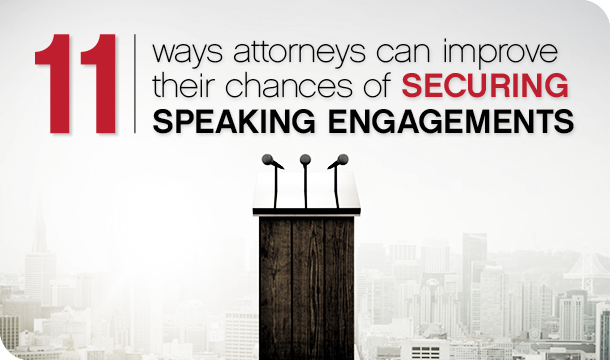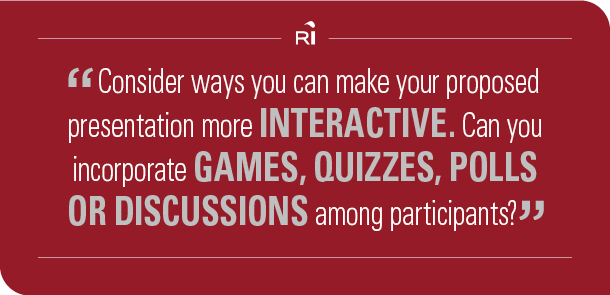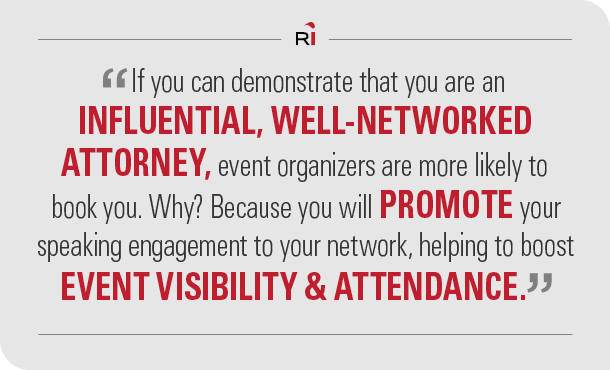11 ways attorneys can improve their chances of securing speaking engagements

Several years ago, I set out to become an industry speaker to promote Reputation Ink’s law firm public relations services to prospective clients. I’ve now spoken to many professional organizations at the local, regional and national levels and can attribute those speaking engagements to winning several new accounts.
Securing speaking engagements may be one of the most effective ways for attorneys to showcase their knowledge and get in front of prospective clients. However, the higher-profile speaking engagements are competitive and are often monopolized by just a few of the top professionals in any given industry. That’s why you must work hard to stand out.
Here are the lessons I’ve learned in my own process of securing speaking opportunities that any lawyer can use to book their own gigs.
1. Plan far, far in advance
Most conferences start planning their agendas and lining up speakers anywhere from four to six months out. Thus, it’s important to look at speaking as a multi-year endeavor.
Once you’ve identified the organizations and events best suited to reach your targeted audience, sign up for email alerts so you’re notified as soon as the call for speakers is out. You can also follow the event on social media, and keep tabs on any hashtags for the event.
2. Create a speaker reel
The worst-case scenario for an event organizer is to book a speaker who bores the audience to death. That’s why many speaking applications now ask for videos of prior speaking engagements. Event organizers are looking to “try before they buy” — to see first-hand how you speak. Are you engaging? Do you project your voice well? Do you interact with the audience?
Thus, you should aim to create a “speaker reel” (also called a demo reel). A speaker reel should be no more than two to three minutes long and ideally shows you speaking at your best and features some audience reactions. The idea is to demonstrate to event organizers that you are well-spoken, engaging, energetic, interactive and interesting.
If you have a speaking engagement on the books, arrange for someone to record your talk. As many events now offer attendees a virtual option in the COVID era, the organizers may already be recording all the sessions. Make sure to inquire in advance and request a copy of the video recording of your presentation.
If you don’t have a speaking engagement coming up, you can instead create a video of you speaking in your office, perhaps to an audience of your fellow attorneys or staff members. Introduce yourself, describe your practice and expertise, and then provide short snippets of your proposed presentations, focusing on the key points that you will make.
3. Get speaking testimonials and referees
Think about a time when you have presented to an audience, even if it was simply a lunch-and-learn session for a client or a small CLE workshop. If you believe your presentation was well-received, ask an audience member to provide a testimonial.
In addition to securing a written review, ask if they are happy to have their name listed as a reference. Most speaking applications ask for at least two to three referees. Make sure to note when and where the person saw you speak.
4. Develop a winning presentation topic
When submitting a speaking application, research the event thoroughly, including the profile of the attendees. Make sure your proposed topic clearly addresses the audience and its information needs.
In addition, most conferences feature a theme. Aligning your presentation topic with the theme will increase your chances of success. This might mean simply tweaking the presentation to include a few theme soundbites or references, while retaining the substance of your original idea.
Finally, try to propose something that addresses a trend or hot-button issue. Even if it’s an “evergreen” topic (something that’s always relevant) incorporate something new or frame your talking points within a trend. People often attend conferences and events to stay abreast of what’s hot/new/next, so instead of proposing a 101-style presentation or an “in the weeds” talk, instead focus on the latest and greatest innovations or trends.
5. Show vs. tell: Interact and engage with the audience
One of the biggest trends I’ve noticed in recent speaking applications I’ve submitted is a preference toward interactive formats. Event organizers are looking for something different from the traditional “lecture” style.
Consider these instructions from the Legal Marketing Association’s 2022 call for speakers:
“Priority will be given to sessions whose format embraces meaningful interactivity and challenges the traditional way of presenting. Examples:
- Small groups are presented with a situation and discuss potential solutions or outcomes.
- Have participants reiterate learned information through a game or activity.
- Session includes real world applicability resources (i.e. worksheets, templates, tools).”
Consider ways you can make your proposed presentation more interactive. Can you incorporate games, quizzes, polls or discussions among participants?

6. Co-present with a client
For many events, the majority of speaker applications will come from vendors (e.g., consultants and law firm attorneys), and most of the audience members will be client-side (e.g., in-house counsel and C-level executives). You can stand out by submitting an application to co-present with a client.
As the client is likely to fit the profile of the event’s audience, by co-presenting you are showing organizers that you will speak directly to the needs of the audience. It also gives your topic a stamp of approval and lends credibility to you as an expert (as your client is willing to tie their reputation to you by co-presenting).
7. Present a real-world case study
People love to learn from real-world examples and the law is no different, despite the confidential nature of most legal work. Try to develop a presentation topic using a real-world case study, even if some details must be “anonymized” by using generic descriptions in place of names and other identifying information.
8. Show the organizers how you can help them gain more exposure through your own network
Do you hold a leadership position in an influential organization? Do you have a large number of LinkedIn connections or Twitter followers? What about a targeted email list of engaged subscribers? If you can demonstrate that you are an influential, well-networked attorney, event organizers are more likely to book you. Why? Because you will promote your speaking engagement to your network, helping to boost event visibility and attendance.

In your speaking application, describe your network and be clear that you will aggressively promote your speaking engagement to that network.
9. Start small and work your way up
As mentioned above, a worst-case scenario for an event organizer is to book a speaker who is terrible at speaking — no eye contact, mumbling, lots of “ums” — you get it. That’s why building a “speaking portfolio” is one of the best strategies to secure higher-profile gigs.
In the beginning, look at smaller, local or regional opportunities as a way to build your speaker portfolio. Leverage those connections and the experience to gain a foothold into bigger event opportunities.
10. Add presentations to your bio and LinkedIn profile
Any time you speak to an audience, add it to your bio on the firm’s website and to your LinkedIn profile. As of today, LinkedIn does not have a category for presentations. Instead, try these sections:
- Work Experience: Under this section, you can add “Speaker” as a category and include the different speaking engagements you have spoken at, including the name of the event/organization and title of your presentation.
- Professional Summary: In this section, you can list the type of presentations you’ve delivered, the places/groups/organizations that you’ve spoken to, and how long you’ve been presenting.
- Newsfeed: These posts are timely, so you should post before, during and after your engagement in a news-style format.
- Projects: Use this section to list them if you don’t feel comfortable adding to Work Experience or your Professional Summary.
11. Secure CLE credit
If your target audience is other attorneys (whether in-house or referring attorneys at other law firms), consider securing continuing legal education (CLE) credit for your presentation. Not only will that help other attorneys meet their own CLE requirements, but in some jurisdictions you may be able to claim credit for your own event and even add an hour of preparation credit.
However, securing CLE credit can be a laborious process. Work with a provider such as the CEU Institute that understands the varying requirements by state and can manage the process for.
Becoming an experienced public speaker is a long game, but well worth it. If you’d like more tips on securing speaking opportunities, contact me at michelle@rep-ink.com.







